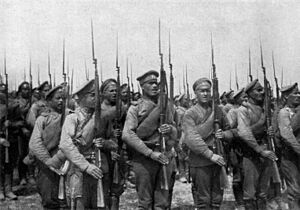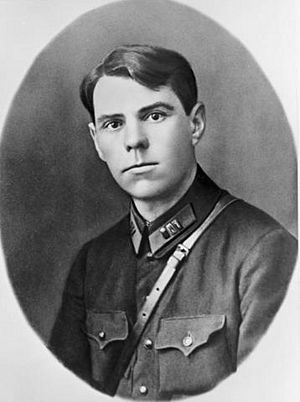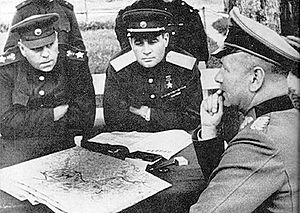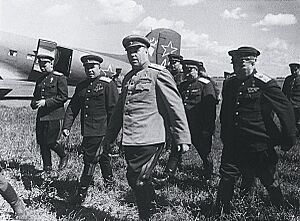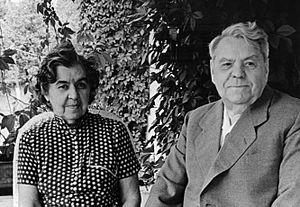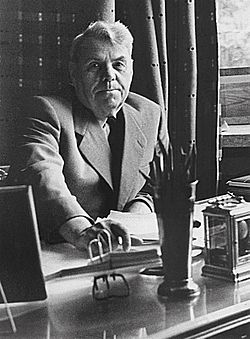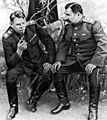Aleksandr Vasilevsky facts for kids
Quick facts for kids
Aleksandr Vasilevsky
Алекса́ндр Василе́вский |
|
|---|---|
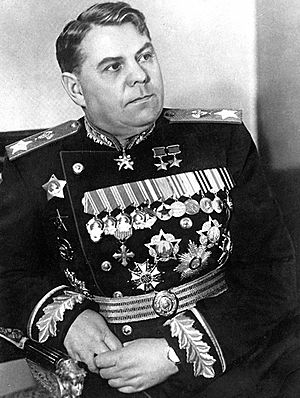
Vasilevsky in 1944
|
|
| Minister Of War Union of Soviet Socialist Republics |
|
| In office 25 February 1950 – 15 March 1953 |
|
| Premier | Joseph Stalin (1950–1953) Georgy Malenkov (1953) |
| Preceded by | Position established |
| Succeeded by | Position abolished (Post re-established as Ministry of Defence, with Nikolai Bulganin succeeding) |
| Minister of the Armed Forces Union of Soviet Socialist Republics |
|
| In office 24 March 1949 – 25 February 1950 |
|
| Premier | Joseph Stalin |
| Preceded by | Nikolai Bulganin |
| Succeeded by | Position abolished |
| Personal details | |
| Born | 30 September 1895 Novaya Golchikha, Vichuga, Russian Empire |
| Died | 5 December 1977 (aged 82) Moscow, Russian SFSR, Soviet Union |
| Resting place | Kremlin Wall Necropolis, Moscow |
| Awards | Hero of the Soviet Union (2) Order of Victory (2) Order of Suvorov, 1st Class Order of Lenin (8) Order of the Red Banner (2) Virtuti Militari |
| Military service | |
| Allegiance | |
| Years of service | 1915–1959 |
| Rank | Marshal of the Soviet Union |
| Commands | Chief of the General Staff 3rd Belorussian Front Far East Command |
| Battles/wars |
|
Aleksandr Mikhaylovich Vasilevsky (Алекса́ндр Миха́йлович Василе́вский) was a very important Soviet military leader. He was born on September 30, 1895, and passed away on December 5, 1977. He became a Marshal of the Soviet Union in 1943.
During World War II, Vasilevsky was the Chief of the General Staff for the Soviet Armed Forces from 1942 to 1945. This meant he helped plan and organize almost all the major Soviet attacks. These included the famous Operation Uranus in November 1942, which helped turn the tide at Battle of Stalingrad, and the attacks on East Prussia and Königsberg in 1945. He also led the Soviet invasion of Manchuria against Japan in August 1945.
After the war, he served as the Minister of Defense from 1949 to 1953. Vasilevsky started his military journey in World War I and later joined the Red Army during the Russian Civil War. He quickly moved up the ranks, showing great skill in training soldiers. He was known for his calm and diplomatic nature, which helped him work closely with Joseph Stalin.
Biography
Early Life and Education
Aleksandr Vasilevsky was born on September 30, 1895, in a small village called Novaya Golchikha, which is now part of Vichuga, Russia. He was one of eight children in his family. His father, Mikhail Aleksandrovich Vasilevsky, was a priest. His mother, Nadezhda Ivanovna Sokolova, was also from a priest's family.
Vasilevsky's family was quite poor. His father worked hard to earn money, and the children helped out in the fields. In 1897, his family moved to Novopokrovskoe, where his father became a priest at a new church. Aleksandr started his education at the church school there. In 1909, he went to a seminary in Kostroma. This was a big financial challenge for his parents.
Joining the Military
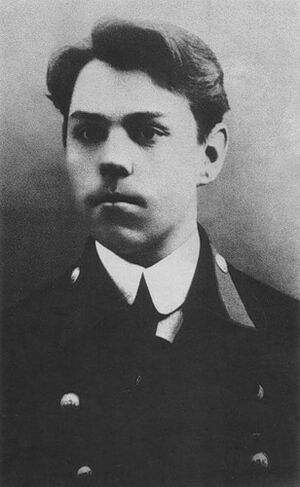
After finishing seminary and working as a teacher for a few years, Vasilevsky had plans to become a farmer or a surveyor. However, World War I started, and he felt a strong sense of patriotism. He decided to become a soldier instead. In February 1915, he joined the Alexander Military Law Academy.
After four months of training, he was sent to the front lines in May 1915. He started as a junior officer. By the spring of 1916, he was leading a company of soldiers, which became very well-known. In May 1916, he led his men during the Brusilov offensive. He became a battalion commander and reached the rank of captain by the age of 22.
Russian Revolution and Civil War
In November 1917, after the October Revolution in Russia, Vasilevsky decided to leave the military. He felt that the people needed peace. He returned to his home village.
However, in April 1919, he was called back to serve in the Red Army. He commanded a company that helped fight against peasant uprisings. Later that year, he took command of a regiment. His regiment did not fight in the main battles of the Russian Civil War. In December 1919, Vasilevsky was sent to the Western front. He took part in the Polish–Soviet War.
As a deputy regimental commander, Vasilevsky fought in battles near the Berezina river. He also participated in the Soviet attack towards Vilnius in July 1920. His regiment stayed in the Wilno area until the Peace of Riga treaty was signed.
Between the Wars
After the Peace of Riga treaty, Vasilevsky continued to fight against remaining forces in Belarus until August 1921. By 1930, he had commanded several rifle regiments. He was very good at organizing and training his troops. In 1928, he completed a special course for regimental commanders.
During these years, Vasilevsky became friends with important military leaders and members of the Communist Party. One of them, Boris Shaposhnikov, became a mentor to him. In 1931, Vasilevsky was appointed to the Directorate of Military Training. Here, he helped oversee the Red Army's training and worked on military manuals. He also met future famous generals like Georgy Zhukov.
In 1937, many senior military commanders were removed during a period known as the Great Purge. This opened up new opportunities. Vasilevsky was appointed to the General Staff in October 1937. He was responsible for training senior officers. In 1938, he joined the Communist Party of the Soviet Union. In 1939, he became the Deputy Commander of the Operations Directorate of the General Staff. In this role, he helped plan the Winter War against Finland.
Vasilevsky often met with Joseph Stalin. During one meeting, Stalin learned that Vasilevsky had stopped contact with his family because his father was a priest. Stalin was surprised and told him to reconnect with his parents and help them.
World War II Leadership
Early War and Moscow Defense
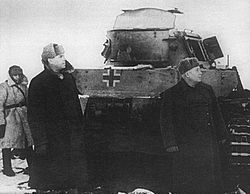
By June 1941, Vasilevsky was working long hours at the General Staff. On June 22, 1941, Germany launched Operation Barbarossa, attacking the Soviet Union. In August 1941, Vasilevsky became the Chief of the Operations Directorate and Deputy Chief of the General Staff. This made him a key leader in the Soviet military.
In October 1941, German forces were moving towards Moscow in Operation Typhoon. Vasilevsky was sent to the Western Front to help organize the defense. He worked tirelessly to make sure supplies and soldiers reached the front lines. Even when most of the General Staff left Moscow, Vasilevsky stayed to keep things running. On October 28, 1941, he was promoted to Lieutenant General.
The Battle of Moscow was very tough. Vasilevsky often worked until 4 a.m. When Marshal Shaposhnikov became ill, Vasilevsky had to make many important decisions on his own. In December 1941, Vasilevsky helped coordinate the Soviet counterattack that pushed the Germans back from Moscow. In April 1942, he became the acting Chief of Staff and was promoted to Colonel General.
Stalingrad and Turning the Tide
In May 1942, the Second Battle of Kharkov was a difficult moment. A Soviet attack failed, leading to a major German advance south. Vasilevsky and Zhukov wanted to pull back the Soviet forces, but Stalin refused. This led to a big defeat for the Red Army.
In June 1942, Vasilevsky became the Chief of the General Staff. In October 1942, he also became Deputy Minister of Defense. He was now responsible for planning major Soviet attacks. From July 1942, Vasilevsky was at the Stalingrad front, which he knew would be a key battleground.
The Battle of Stalingrad was another challenging time. Vasilevsky worked to coordinate the defenses. On September 12, 1942, Vasilevsky and Zhukov presented their plan for the Stalingrad counteroffensive to Stalin. Two months later, on November 19, Operation Uranus began. Vasilevsky coordinated the attack that surrounded the German army at Stalingrad, leading to a huge Soviet victory.
Pushing Towards Victory
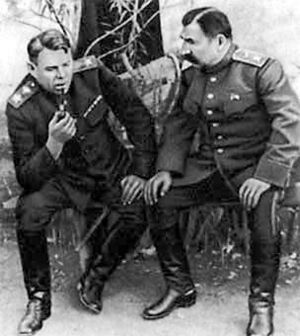
In January 1943, Vasilevsky coordinated attacks on the upper Don River. These attacks led to the encirclement of several enemy divisions. In January, Vasilevsky was promoted to General of the Army. Just 29 days later, on February 16, 1943, he became a Marshal of the Soviet Union.
In March 1943, after the Third Battle of Kharkov, Vasilevsky and Zhukov convinced Stalin to wait for the German army to attack first at Kursk. When the Battle of Kursk began on July 4, 1943, Vasilevsky coordinated two major Soviet Fronts. After the German defeat at Kursk, Vasilevsky planned and carried out attacks to clear Nazi forces from the Donbas region and later from Crimea.
In early 1944, Vasilevsky coordinated a successful Soviet attack in eastern Ukraine. On April 10, 1944, he received the Order of Victory, one of the highest military awards. In May 1944, his car hit a mine during an inspection, and he was injured.
During Operation Bagration, a huge Soviet attack in Belarus, Vasilevsky coordinated two major Fronts. On July 29, 1944, he was awarded the title of Hero of the Soviet Union for his military successes. In February 1945, Vasilevsky took direct command of the 3rd Belorussian Front to lead the East Prussian Operation. He organized the attacks on Königsberg and Pillau. He also negotiated the surrender of the Königsberg garrison. For his success in East Prussia, Vasilevsky received his second Order of Victory.
War Against Japan
In 1944, Stalin decided that Vasilevsky would lead Soviet forces in the Far East after the war with Germany ended. Vasilevsky started planning the war against Japan in late 1944. In June 1945, Stalin approved his plan. Vasilevsky then became Commander-in-Chief of Soviet Forces in the Far East.
He led the Manchurian Strategic Offensive Operation, also known as the Battle of Manchuria. In just 24 days, from August 9 to September 2, 1945, the Japanese armies in Manchukuo were defeated. For this great success, Vasilevsky received his second Hero of the Soviet Union award on September 8.
After World War II
From 1946 to 1949, Vasilevsky remained Chief of Staff. Then, he became the Defense Minister from 1949 to 1953. After Stalin's death in 1953, Vasilevsky's influence decreased. He was replaced by Nikolai Bulganin but remained Deputy Defense Minister. In 1956, he was given a less powerful role as Deputy Defense Minister for Military Science.
In 1957, he was retired by Nikita Khrushchev. In 1959, he was given an honorary position as a General Inspector of the Ministry of Defense. In 1973, he published his memoirs, titled The Cause of My Whole Life. Aleksandr Vasilevsky passed away on December 5, 1977. His ashes were placed in the Kremlin Wall Necropolis in Moscow, honoring his service to his country.
Family
In 1923, Vasilevsky married Serafima Nikolaevna Voronova. They had a son named Yuri (1925-2013), who later became a lieutenant general in the Soviet Air Force. Yuri married Era Zhukova, the daughter of the famous general Georgy Zhukov.
Vasilevsky later married Ekaterina Vasilievna Saburova. They had a son named Igor (born 1935). Igor became a well-known architect and received important awards.
Awards
Vasilevsky became one of the most decorated commanders in Soviet history. He received the "Gold Star" Hero of the Soviet Union award twice for his actions against Germany and Japan. He also received two Orders of Victory, an achievement only matched by Zhukov and Stalin. These were for his successes in Crimea and Prussia.
Throughout his career, he received eight Orders of Lenin, the Order of the October Revolution, two Orders of the Red Banner, and a first-class Order of Suvorov. His first award, an Order of the Red Star, was for his excellent work during the Winter War in 1940. He also received the Order for Service to the Homeland in the Armed Forces of the USSR, 3rd class, in 1975, for his entire military career.
Vasilevsky was also awarded fourteen medals. These included medals for defending Leningrad, Moscow, and Stalingrad, and for capturing Königsberg. He received medals for victory over Germany and Japan. He also had several commemorative medals, celebrating anniversaries of the Soviet Armed Forces and the victory in World War II. He also received the Eight Hundredth Anniversary of Moscow medal. In addition to Soviet awards, Vasilevsky received several foreign decorations, such as the Polish Virtuti Militari Order.
- Soviet Union
  |
|||
A reconstruction of Vasilevsky's ribbon bar, without foreign and Imperial era decorations
- "Gold Star" Hero of the Soviet Union, twice (29 July 1944, 8 September 1945)
- Order of Victory, twice (No. 2 and No. 7, 10 April 1944, 19 April 1945)
- Eight Orders of Lenin (21 May 1942, 29 July 1944, 21 February 1945, 29 September 1945, 29 September 1955, 29 September 1965, 29 September 1970, 29 September 1975)
- Order of the October Revolution (22 February 1968)
- Order of Red Banner, twice (3 November 1944, 20 June 1949)
- Order of Suvorov, 1st class (28 January 1943)
- Order of the Red Star (1939)
- Order for Service to the Homeland in the Armed Forces of the USSR, 3rd class (30 April 1975)
- "For military valour. To commemorate the 100th anniversary of the birth of Vladimir Ilyich Lenin"
- Medal "For the Defence of Moscow"
- Medal "For the Defence of Stalingrad"
- Medal "For the Capture of Königsberg"
- Medal "For the Victory over Germany in the Great Patriotic War 1941–1945"
- Medal "For the Victory over Japan"
- Jubilee Medal "Twenty Years of Victory in the Great Patriotic War 1941–1945"
- Jubilee Medal "Thirty Years of Victory in the Great Patriotic War 1941–1945"
- Medal "In Commemoration of the 800th Anniversary of Moscow"
- Medal "Veteran of the Armed Forces of the USSR"
- Jubilee Medal "XX Years of the Workers' and Peasants' Red Army"
- Jubilee Medal "30 Years of the Soviet Army and Navy"
- Jubilee Medal "40 Years of the Armed Forces of the USSR"
- Jubilee Medal "50 Years of the Armed Forces of the USSR"
- Honorary weapon with gold National Emblem of the USSR (1968)
- Imperial Russia
| Order of Saint Anna, 4th class | |
| Order of Saint Stanislaus, 3rd class | |
| Cross of St. George, 4th class |
- Foreign awards
| Order of Sukhbaatar, twice (Mongolia, 1966, 1971) | |
| Order of the Red Banner (Mongolia, 1945) | |
| Medal "30 Years of the Victory in Khalkhin-Gol" (Mongolia) | |
| Medal "50 Years of the Mongolian People's Revolution" (Mongolia) | |
| Medal "30 Years of Victory over Militaristic Japan" (Mongolia) | |
| Medal "50 Years of the Mongolian People's Army" (Mongolia) | |
| Order of the White Lion, 1st class (Czechoslovakia, 1955) | |
| Military Order of the White Lion "For Victory", 1st class (Czechoslovakia, 1945) | |
| War Cross 1939–1945 (Czechoslovakia, 1943) | |
| Medal "In Commemoration of the Battle of Dukla Pass" (Czechoslovakia, 1960) | |
| Order of Karl Marx (East Germany, 1975) | |
| Virtuti Militari, 1st class (Poland, 1946) | |
| Order of Polonia Restituta, 2nd class (Poland, 1968) | |
| Order of Polonia Restituta, 3rd class (Poland, 1973) | |
| Cross of Grunwald, 1st class (Poland, 1946) | |
| Order of The People's Republic of Bulgaria, 1st class (Bulgaria, 1974) | |
| Medal "90th Anniversary of the Birth of Georgi Dimitrov" (Bulgaria, 1972) | |
| Grand Officer of the Legion d'Honneur (France, 1944) | |
| Croix de guerre (France, 1944) | |
| Honorary Knight Grand Cross of the Order of the British Empire (UK, 1943) | |
| Chief Commander, Legion of Merit (U.S., 1944) | |
| Order of National Liberation (Yugoslavia, 1946) | |
| Order of the Partisan Star, 1st class (Yugoslavia, 1946) | |
| Order of the National Flag, 1st class (North Korea, 1948) | |
| Medal for the Liberation of Korea (North Korea, 1948) | |
| Special Grand Cordon of the Order of the Sacred Tripod (Republic of China, 1946) | |
| Medal of Sino-Soviet Friendship (China, 1956) |
Personality and Opinions
Vasilevsky was seen by other military leaders as a kind and calm commander. General Sergei Shtemenko, who worked with him during the war, described Vasilevsky as a brilliant and modest officer. He noted Vasilevsky's amazing talent for planning military strategies. Vasilevsky also showed respect for his subordinates and was known for his diplomacy and politeness. These qualities were appreciated by Stalin, who trusted him greatly.
Georgy Zhukov, another famous general, described Vasilevsky as a very capable commander. He said Vasilevsky earned great respect from everyone. Zhukov also noted that Vasilevsky had Stalin's exceptional trust and could even persuade him during difficult discussions. Vasilevsky was so modest that he never even mentioned his many awards, including his two Orders of Victory, in his own memoirs.
While Vasilevsky's actions were generally praised, some people had different opinions. Nikita Khrushchev once suggested that Vasilevsky was too passive and didn't always stand up to Stalin. However, many historians agree that Vasilevsky was a key figure in the Soviet victory in World War II. He was especially important in planning and carrying out the successful counteroffensive at Stalingrad.
See also
 In Spanish: Aleksandr Vasilevski para niños
In Spanish: Aleksandr Vasilevski para niños
Images for kids
 | Valerie Thomas |
 | Frederick McKinley Jones |
 | George Edward Alcorn Jr. |
 | Thomas Mensah |


